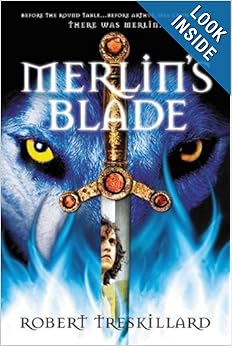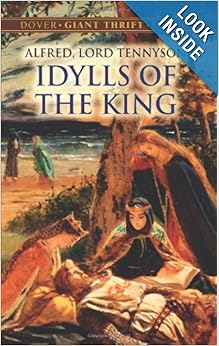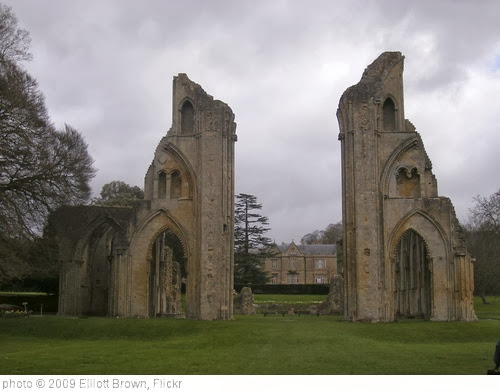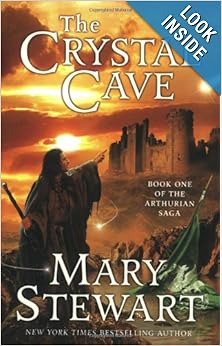Blurb from back cover: “When a meteorite crashes near a small village in fifth century Britain, it brings with it a mysterious black stone that bewitches anyone who comes in contact with its glow—a power the druids hope to use to destroy King Uther’s kingdom. The only person who seems immune is a young, shy, half-blind swordmith’s son named Merlin.”
 This YA title in Zondervan’s new teen fiction imprint Blink joins my shortlist of favorite fantasy novels and series that play off the Arthurian legend of Merlin, King Arthur, and the Knights of the Round Table. Tereskillard’s Merlin is likable and easy to root for, and the minor characters are also well-realized and interesting. The fight between good and evil is engaging, and the ending is not a foregone conclusion. Even though Christ is greater than the old gods and the new magical stone of the druids, God’s ways are not always our ways and man’s sin and weakness are ever-present, making the story both suspenseful and satisfying.
This YA title in Zondervan’s new teen fiction imprint Blink joins my shortlist of favorite fantasy novels and series that play off the Arthurian legend of Merlin, King Arthur, and the Knights of the Round Table. Tereskillard’s Merlin is likable and easy to root for, and the minor characters are also well-realized and interesting. The fight between good and evil is engaging, and the ending is not a foregone conclusion. Even though Christ is greater than the old gods and the new magical stone of the druids, God’s ways are not always our ways and man’s sin and weakness are ever-present, making the story both suspenseful and satisfying.
I’ve read L’Morte d’Arthur, the long and sometimes repetitive compilation by Sir Thomas Mallory of fifteenth century stories about Arthur and his knights, and despite the repetition and the archaic language, I enjoyed Malory’s version of Arthur very much. I’ve also read several other novels, poems, and series that use these legends as a starting place. Here are some of my favorites:
The Once and Future King by T.H. White. White’s version of the Arthur legend is the source, in its turn, for Disney’s Sword in the Stone and for the musical Camelot. It’s light-hearted and rather fun.
Idylls of the King by Sir Alfred, Lord Tennyson. Arthurian legend in poetic form. Victorian Arthur.
 The old order changeth, yielding place to new;
The old order changeth, yielding place to new;
And we that fight for our fair father Christ,
Seeing that ye be grown too weak and old
To drive the heathen from your Roman wall,
No tribute will we pay: so those great lords
Drew back in wrath, and Arthur strove with Rome.
And Arthur and his knighthood for a space
Were all one will, and through that strength the King
Drew in the petty princedoms under him,
Fought, and in twelve great battles overcame
The heathen hordes, and made a realm and reigned.
If thou shouldst never see my face again,
Pray for my soul. More things are wrought by prayer
Than this world dreams of. Wherefore, let thy voice
Rise like a fountain for me night and day.
For what are men better than sheep or goats
That nourish a blind life within the brain,
If, knowing God, they lift not hands of prayer
Both for themselves and those who call them friend?
 The Pendragon Cycle by Stephen R. Lawhead consists of six novels:
The Pendragon Cycle by Stephen R. Lawhead consists of six novels:
Taliesin (1987)
Merlin (1988)
Arthur (1989)
Pendragon (1994)
Grail (1997)
Avalon (1999)
Lawhead’s druids, as I remember it, were good guys, for the most part, worshipping the One True God, whereas Treskillard takes the opposite approach with the druidow, as he calls them, being the definite bad guys in the story, evil and pagan through and through. Nevertheless, Treskillard, in the author’s note at the end of Merlin’s Blade, thanks Lawhead for his “unique and expert critique” and for inspiring him. There’s apparently room for more than one vision of Arthur and Merlin and druids.
King Arthur and His Knights of The Round Table by Howard Pyle is a summary/re-telling of Mallory without much extraneous material or re-interpretation. Pyle does organize the story and leave out a lot of the repetition to condense it down to a more manageable length.
Rosemary Sutcliff wrote several books related to Arthurian legend and early medieval/Roman Britain: The Lantern Bearers (1959), Sword at Sunset (1963), Tristan and Iseult (1971), The Light Beyond the Forest (1979), The Sword and the Circle (1981), and The Road to Camlann (1981). Excellent stuff.
A Connecticut Yankee in King Arthur’s Court by Mark Twain is mostly ridiculous, but not a bad read.
The last book in C.S. Lewis’s space trilogy, That Hideous Strength, is set in post-modern Britain, but it features the “return of the king” (Arthur) and of Merlin.
 The Crystal Cave, The Hollow Hills and The Last Enchantment, all by Mary Stewart, are called together her Merlin Trilogy. Sh later wrote two more books based on Arthurian legend, The Wicked Day and The Prince and the Pilgrim but I have not read those.
The Crystal Cave, The Hollow Hills and The Last Enchantment, all by Mary Stewart, are called together her Merlin Trilogy. Sh later wrote two more books based on Arthurian legend, The Wicked Day and The Prince and the Pilgrim but I have not read those.
Here There Be Dragons by James Owen, reviewed at Semicolon, has allusions to Arthurian legend: one of the islands in the story is Avalon, and King Arthur has some influence on events in the book.
The Sword in the Tree by Clyde Robert Bulla. Shan, son of Lord Weldon, hides a sword in the hollow of a tree. The events of this book take place during the time of King Arthur and his knights of the Round Table, and Shan eventually ends up in Camelot. This easy chapter book was a favorite of one of my daughters when she was younger.
The Defence of Guenevere by William Morris, with Semicolon commentary.
Of course, when talking about Arthurian farce and legend, one can’t forget the film, Monty Python and the Holy Grail. My friend in high school had the “hand grenade” monologue, and several other parts of the movie, memorized:
Cleric: And Saint Attila raised the hand grenade up on high, saying, “O Lord, bless this thy hand grenade, that with it thou mayst blow thine enemies to tiny bits, in thy mercy.” And the Lord did grin. And the people did feast upon the lambs and sloths, and carp and anchovies, and orangutans and breakfast cereals, and fruit-bats and large chu…
Brother Maynard: Skip a bit, Brother…
Cleric: And the Lord spake, saying, “First shalt thou take out the Holy Pin. Then shalt thou count to three, no more, no less. Three shall be the number thou shalt count, and the number of the counting shall be three. Four shalt thou not count, neither count thou two, excepting that thou then proceed to three. Five is right out. Once the number three, being the third number, be reached, then lobbest thou thy Holy Hand Grenade of Antioch towards thy foe, who, being naughty in my sight, shall snuff it.
I liked Merlin’s Blade well enough that I have the second book in the planned Merlin Spiral trilogy, Merlin’s Shadow, on hold at the library. What’s your favorite version of or allusion to Arthurian legend?